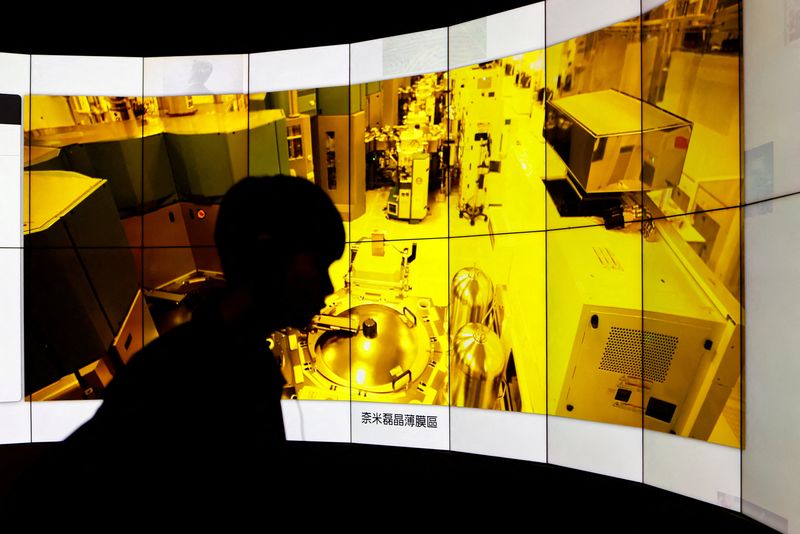By Fanny Potkin
SINGAPORE (Reuters) - Some Chinese AI chip companies are now designing less powerful processors to retain access to Taiwan Semiconductor Manufacturing Co (TSMC) production in the face of U.S. sanctions, four people with knowledge of the matter said.
Aiming to impede breakthroughs in artificial intelligence and supercomputing by China's military, Washington has imposed a series of export controls on highly sophisticated processors from companies such as Nvidia (NASDAQ:NVDA) and on chip manufacturing equipment. Those restrictions also prevent TSMC - which uses U.S. chipmaking tools - as well as other overseas chip manufacturers from taking orders to produce them.
The most recent set of U.S. export controls imposed last October have exposed just how limited China's production capacity for advanced chips is and how dependent Chinese AI chip design companies are on TSMC - the world's leading chip contract manufacturer, the sources said.
The four sources, one of which has direct knowledge of the issue, declined to be identified due to the sensitivity of chip-related matters in China.
Two top Chinese AI chip firms, MetaX and Enflame, submitted downgraded designs of their chips to TSMC in late 2023 to comply with U.S. restrictions, according to two of the people.
The companies have previously marketed their chips as being comparable to Nvidia's graphics processing units (GPUs).
Shanghai-based MetaX has developed a downgraded product called the C280, the two people said, adding it ran out of stock of its most advanced GPU, the C500, in China earlier this year.
MetaX, founded in 2020 by former Advanced Micro Devices (NASDAQ:AMD) executives, did not respond to a Reuters request for comment.
Enflame, also Shanghai-based and founded in 2018, also did not respond to a request for comment. It counts tech behemoth Tencent among its backers and raised $2.7 billion last year.
TSMC declined to comment on individual customers, saying only that it works with clients to make sure it is in compliance with jurisdictions relevant to its operations.
Both MetaX and Enflame are so-called "little giants" - young companies selected by Chinese authorities for their potential in critical sectors, making them eligible for state support.
MetaX last month gained government funding for a project to develop a domestically produced high-level AI training chip and has multiple R&D and fab projects across China. Enflame sells its chips to state-owned enterprises and has cooperated with several local governments on projects.
In addition to tech giant Huawei, China has some 50 AI chip startups that are seeking to compete with Nvidia, the U.S. firm's Chief Executive Jensen Huang estimated in December.
Some of those companies, however, have had U.S. export restrictions directly imposed on them and are no longer able to seek out overseas foundries, putting them in even more of a production quandary.
Production woes for Chinese AI chip startups are likely to further benefit Huawei which is making inroads against Nvidia in China after the U.S. firm had to develop weaker chips specifically for the Chinese market due to the export curbs.
SMIC ACCESS
Since tech tensions with the United States heated up in 2018, China has ramped up efforts to develop self-sufficiency in chips, pumping huge sums into the sector.
Last month, the government announced the third iteration of its China Integrated Circuit Industry Investment Fund with $48 billion of financing for the industry, bringing the total amount provided by the fund since 2014 to over $100 billion.
The sector has also benefited from separate local government funds and a range of subsidies including tax breaks and low-interest loans.
But while China has an estimated 44 foundries, only Semiconductor Manufacturing International Corp (SMIC) is capable of producing large volumes of highly advanced GPUs, two of the sources said. And until recently, SMIC's production capacity of that level was entirely reserved for Huawei, they also said.
SMIC did not respond to a request for comment.
Huawei, whose access to overseas chip manufacturing was cut off in 2020 by U.S sanctions, declined to comment. Washington argues the firm poses a threat to U.S. national security, a charge that the company denies.
Three of the four sources said SMIC agreed this year to allot a limited amount of its production capacity to Chinese AI chip firms that had been directly sanctioned by Washington and blocked from overseas production.
One such firm was state-backed Cambricon which the sources said has been struggling since it was hit with U.S. restrictions in late 2022 on concerns it could supply AI chip technology to the Chinese military.
Cambricon, which said in a call with analysts last year that it was facing product supply pressures, did not respond to a request for comment.

China has, in response to U.S. sanctions, accused Washington of generalising the concept of national security and using state power to expand a crackdown on Chinese companies.
($1 = 7.2440 Chinese yuan)